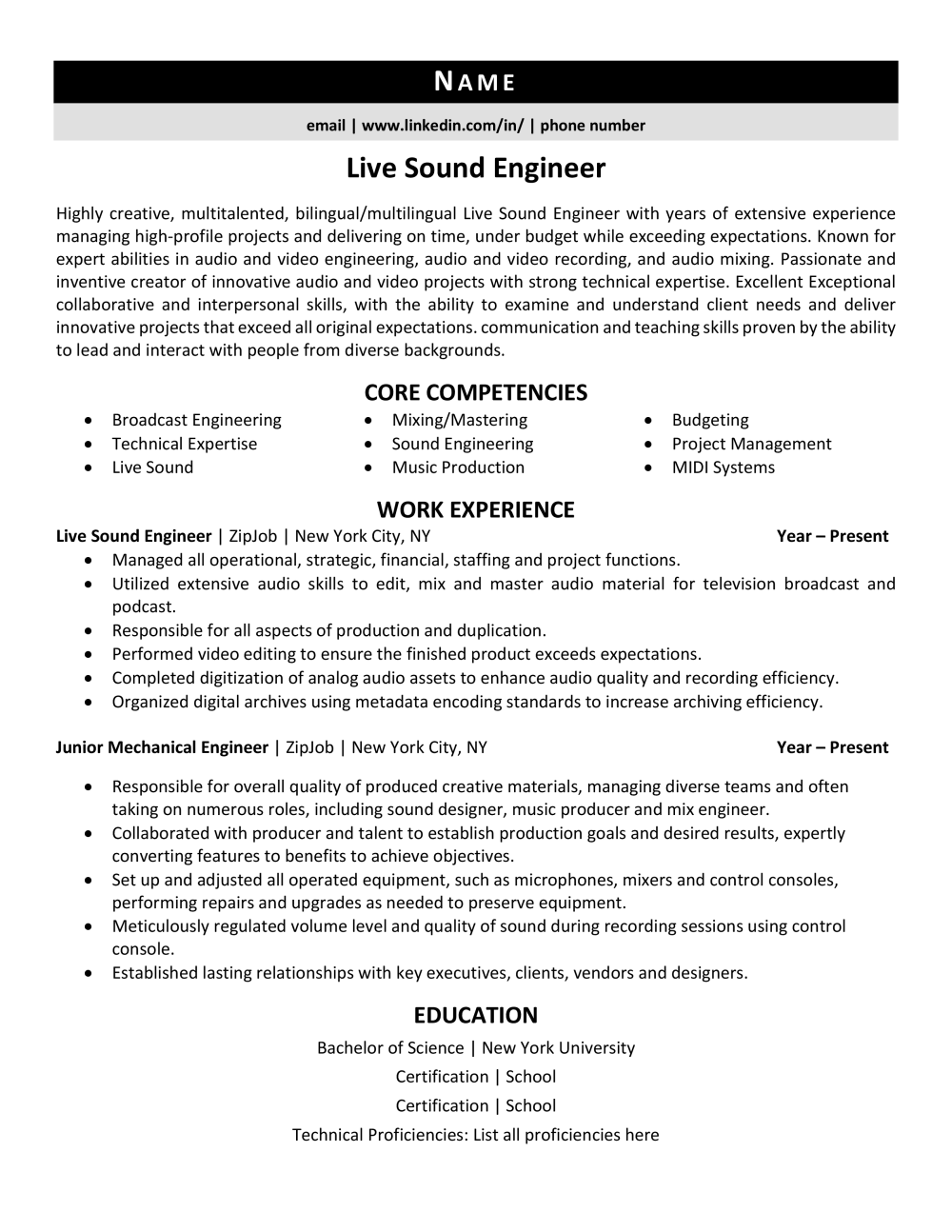Live Sound Engineer Sample
Download and customize our resume template to land more interviews. Review our writing tips to learn everything you need to know for putting together the perfect resume.
A Live Sound Engineer manages all audio and equipment at events. Below is a general job description:
A live sound technician manages audio equipment, such as a mixing board, during indoor or outdoor events and live performances at such locations as sports arenas, churches, theaters or lecture halls. A technician is responsible for sound checks, equipment placement, volume and quality of sound. Typical education for a live sound technician may be a vocational education program, though associate's and bachelor's degrees are available. Study.com
If this is the kind of job you want or you have, you're in the right place! We have a resume example for you and three tips from our professional resume writers below.
Expert Tip
You should never use a creative resume
Many job seekers think that an eye-catching resume template will help them stand out to hiring managers and increase their chances of landing an interview. This is a myth put out by resume builders that value design over content.
The truth is that most hiring managers prefer a traditional resume format.
Creative resume templates, like the one pictured here, can actually hurt your chances of landing an interview. Instead, you should use a basic resume format that quickly communicates your basic information and qualifications–like the one included below.
Live Sound Engineer resume (text format)
How confident are you feeling about your resume? If you need more help, you can always refer to the following resume sample for a position.
Name
Title
City, State or Country if international
Phone | Email
LinkedIn URL
LIVE SOUND ENGINEER PROFESSIONAL
Highly creative, multitalented, bilingual/multilingual Live Sound Engineer with years of extensive experience managing high-profile projects and delivering on time, under budget while exceeding expectations. Known for expert abilities in audio and video engineering, audio and video recording, and audio mixing. Passionate and inventive creator of innovative audio and video projects with strong technical expertise. Excellent Exceptional collaborative and interpersonal skills, with the ability to examine and understand client needs and deliver innovative projects that exceed all original expectations. communication and teaching skills proven by the ability to lead and interact with people from diverse backgrounds.
CORE COMPETENCIES
Broadcast Engineering
Technical Expertise
Live Sound
Mixing/Mastering
Sound Engineering
Music Production
Budgeting
Project Management
MIDI Systems
PROFESSIONAL EXPERIENCE
Live Sound Engineer
ZipJob, New York NY | Year to Year
Responsibilities
Managed all operational, strategic, financial, staffing and project functions.
Utilized extensive audio skills to edit, mix and master audio material for television broadcast and podcast.
Responsible for all aspects of production and duplication.
Performed video editing to ensure the finished product exceeds expectations.
Completed digitization of analog audio assets to enhance audio quality and recording efficiency.
Organized digital archives using metadata encoding standards to increase archiving efficiency.
Junior Mechanical Engineer
ZipJob, New York NY | Year to Year
Responsibilities
Responsible for overall quality of produced creative materials, managing diverse teams and often taking on numerous roles, including sound designer, music producer and mix engineer.
Collaborated with producer and talent to establish production goals and desired results, expertly converting features to benefits to achieve objectives.
Set up and adjusted all operated equipment, such as microphones, mixers and control consoles, performing repairs and upgrades as needed to preserve equipment.
Meticulously regulated volume level and quality of sound during recording sessions using control console.
Established lasting relationships with key executives, clients, vendors and designers.
EDUCATION
Complete School Name, City, St/Country: List Graduation Years If Within the Last Ten Years
Complete Degree Name (Candidate) – Major (GPA: List if over 3.3)
Relevant Coursework: List coursework taken (even include those you are planning on taking)
Awards/Honors: List any awards, honors or big achievements
Clubs/Activities: List clubs and activities in which you participated
Relevant Projects: List 2-3 projects you have worked on
Everything you need to write your live sound engineer resume
Now that you’ve seen an example of a job winning Live Sound Engineer resume, here are some tips to help you write your own. You should always begin with a summary section. Remember to use basic formatting with clear section headings and a traditional layout. Finally, be sure to include top skills throughout your resume. We’ve included several examples common for Live Sound Engineer below.
Let’s start with your resume summary section.
1. Summary
The resume summary replaces the out-of-date resume objective. A summary outlines the most impressive parts of your resume for easy recall by your potential employer, while also serving to fill in personal qualities that may not appear elsewhere on the page. Remember that summaries are short and consist of pithy sentence fragments! You can check out the Live Sound Engineer resume example for more information!
Expert Tip
Always start with your most recent positions at the top of your resume. This is called reverse-chronological format, and keeps your most relevant information easy for hiring managers to review.
2. Formatting
Our experts recommend you start your resume with a resume summary, like the one above. Other common sections are Work Experience, Education, and either Skills or Core Competencies. Here are some guides from our blog to help you write these sections:
Some resumes will include other sections, such as Volunteer Experience or Technical Skills. When it comes to what sections you need to include on your resume, you will know best!
Other sections for you to consider including are foreign language skills, awards and honors, certifications, and speaking engagements. These could all be relevant sections for your resume.
3. Appropriate skills
You should always tailor your resume to include the hard skills and soft skills you have and employers want. Hard skills are the technical know-how you need to complete a job, such as accounting or Google Analytics. You can include hard skills in your core competencies section. Soft skills are harder to quantify, so they require more information to explain your ability. Some top soft skill examples include communication, problem solving, and emotional intelligence. Use examples of how you use your key soft skills to accomplish goals throughout your work history, resume summary, and resume title.
4. Experience section
Your Work Experience section should make up the bulk of your resume. This section should include your relevant job titles, companies that employed you, and the dates you were employed.
Your Work Experience section should make up the bulk of your resume. This section should include your relevant job titles, companies that employed you, and the dates you were employed. Most people will finish this section by listing daily duties in short bullet points. Don't be one of them! To make your resume stand out, you need to add your accomplishments and key skills to your resume's Work Experience section. Here are three tips from our experts:
Use the STAR method to describe a situation, task, action, and result. This is adapted from a behavioral interview technique, so interviewers will recognize the format. it's also a great chance for you to organize your key accomplishments.
Don't forget about LinkedIn! The majority of employers are going to look you up on LinkedIn, so it's smart to make sure your LInkedIn profile is up to date and include your URL in your resume's contact section.
Always include a cover letter. Not everyone will bother, so it helps you look like a serious job applicant. It's also your chance to introduce yourself: who you are, why you're applying for this job, and how you want to proceed.
Let’s wrap it up!
Standout resumes will include a resume summary, a traditional reverse-chronological layout, and the skills and experience relevant to your job target. This resume example shows how to include those elements on a page. It’s up to you to insert your personal compelling qualifications.
Keep your resume format easy to scan by both humans and computers; our resume template is designed by our experts to satisfy both audiences. And be sure to include your own skills, achievements, and experiences. Job-winning resumes are resumes that successfully market you, leading recruiters and hiring managers to want to learn more!
Finally, emphasize your interest with a customized cover letter. When writing, remember that the resume and cover letter should support each other. Check out our cover letter tips and examples for more advice.
Didn’t get the specific answers you were looking for on this page? Hire a professional resume writer to get the advice you need to land your next job.
Related posts:




